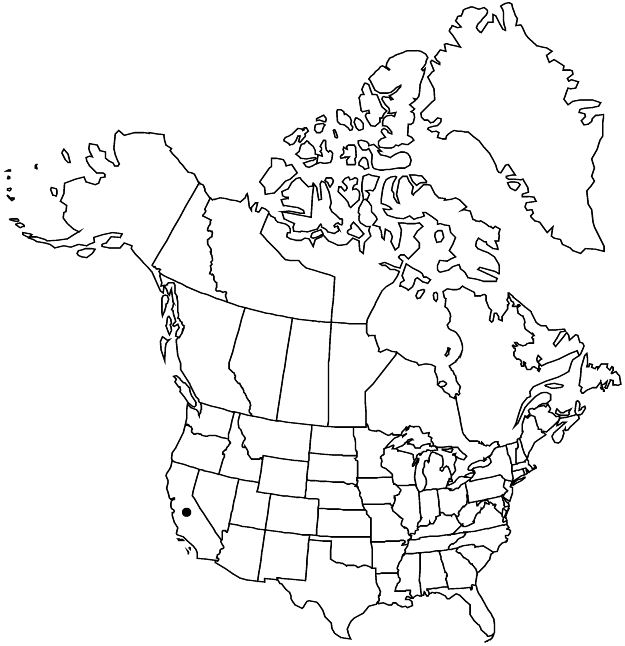Difference between revisions of "Ivesia patellifera"
Syst. Bot. 14: 232. 1989.
FNA>Volume Importer |
imported>Volume Importer |
||
| (6 intermediate revisions by 2 users not shown) | |||
| Line 15: | Line 15: | ||
|label=Endemic | |label=Endemic | ||
}} | }} | ||
| − | |basionyms={{Treatment/ID/ | + | |basionyms={{Treatment/ID/Basionym |
|name=Potentilla patellifera | |name=Potentilla patellifera | ||
|authority=J. T. Howell | |authority=J. T. Howell | ||
| + | |rank=species | ||
| + | |publication_title=Leafl. W. Bot. | ||
| + | |publication_place=4: 173. 1945 | ||
}} | }} | ||
|synonyms= | |synonyms= | ||
| Line 35: | Line 38: | ||
|distribution=Calif. | |distribution=Calif. | ||
|discussion=<p>Of conservation concern.</p><!-- | |discussion=<p>Of conservation concern.</p><!-- | ||
| − | --><p>Ivesia patellifera is confined to crevices in steep wash and canyon walls in the Kingston Mountains of San Bernardino County.</p> | + | --><p><i>Ivesia patellifera</i> is confined to crevices in steep wash and canyon walls in the Kingston Mountains of San Bernardino County.</p> |
|tables= | |tables= | ||
|references= | |references= | ||
| Line 44: | Line 47: | ||
-->{{#Taxon: | -->{{#Taxon: | ||
name=Ivesia patellifera | name=Ivesia patellifera | ||
| − | |||
|authority=(J. T. Howell) Ertter | |authority=(J. T. Howell) Ertter | ||
|rank=species | |rank=species | ||
| Line 59: | Line 61: | ||
|publication year=1989 | |publication year=1989 | ||
|special status=Conservation concern;Endemic | |special status=Conservation concern;Endemic | ||
| − | |source xml=https:// | + | |source xml=https://bitbucket.org/aafc-mbb/fna-data-curation/src/2e0870ddd59836b60bcf96646a41e87ea5a5943a/coarse_grained_fna_xml/V9/V9_334.xml |
|subfamily=Rosaceae subfam. Rosoideae | |subfamily=Rosaceae subfam. Rosoideae | ||
|tribe=Rosaceae tribe Potentilleae | |tribe=Rosaceae tribe Potentilleae | ||
Latest revision as of 22:56, 5 November 2020
Plants green, ± tufted, often forming hanging clumps, sometimes rosetted. Stems pendent or prostrate to ascending, (0.5–)1–2 dm. Basal leaves planar, (2–)5–15 cm; sheathing base not strigose abaxially; petiole 1–5 cm; lateral leaflets (1–)2–3(–4) per side, separate, obovate to orbiculate, 5–20 mm, incised 1/4–1/2 to base into 5–9 broadly ovate teeth, apex not setose, surfaces short-pilose, ± glandular; terminal leaflets distinct. Cauline leaves (0–)2; blade well developed. Inflorescences (1–)3–20(–35)-flowered, open, (0.5–)1.5–4(–6) cm diam. Pedicels 5–20(–30) mm. Flowers 7–10 cm diam.; epicalyx bractlets 0; hypanthium patelliform, 0.5(–1) × 2–3 mm; sepals 2–4 mm, broadly acute; petals yellow, narrowly oblanceolate, 2–3 mm; stamens 5–10, filaments 0.6–1.2(–1.5) mm, anthers yellow, oblong, 0.8–1 mm; carpels 4–10, styles 1.5–2 mm. Achenes greenish white to light tan, 1.5–2 mm, faintly rugose, ± carunculate.
Phenology: Flowering summer.
Habitat: Dry, rocky outcrops of limestone, usually crevices of more or less vertical protected cliffs or boulders, in conifer woodlands
Elevation: 1400–2200 m
Discussion
Of conservation concern.
Ivesia patellifera is confined to crevices in steep wash and canyon walls in the Kingston Mountains of San Bernardino County.
Selected References
None.
